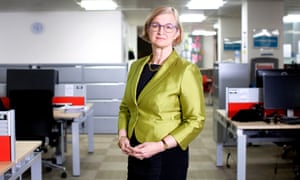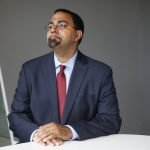
The new chief inspector of schools in England has said in her first interview since taking over at Ofsted that education risks slipping down the political agenda as a result of the national preoccupation with Brexit.
Speaking exclusively to the Guardian, Amanda Spielman said the next few years were not going to be easy and that the political focus was likely to shift away from education as the government’s time and attention were consumed by the process of Britain leaving the EU.
Asked about the challenges facing the education sector, Spielman – who took over from Sir Michael Wilshaw last week – highlighted the anxiety in schools over tightening budgets at a time of considerable change.
She also dismissed the government’s controversial plan to expand selective education by lifting the ban on new grammar schools as a distraction from Ofsted’s work, saying it had little to do with improving the education system.
In addition to being the schools watchdog, Ofsted is responsible for overseeing everything from council children’s services and safeguarding to prison education.
Spielman, whose appointment was initially criticised by some unions because she has never worked as a teacher, said: “Brexit is obviously a huge, huge … national preoccupation. In terms of government thinking and government action, it’s something that’s going to be absorbing so much time and attention that it may be harder to get the focus sometimes that we need.”
Asked if she thought education would be neglected because of Brexit, she said: “Neglected may be putting it too strongly, but it may slide a bit further down the priority list.”
Pressed for her opinion, she refrained from passing judgement. “I think we are where we are. My job isn’t to have views. My job is make sure we do the right thing and make the very best of our responsibilities,” she said.
Spielman, who was one of the founders of the highly successful Ark academy chain and chair of the exams watchdog Ofqual, takes over from a chief who had views on most things and often expressed them publicly, to the irritation of ministers.
Wilshaw took every opportunity in the final weeks and months of his work at Ofsted to express vehement opposition to the prime minister’s aspirations to expand selective education. The government’s consultation, Schools that work for everyone, closed last month, and it will publish its response later in the spring.
Asked for her thoughts on the grammar school plan, Spielman said: “For me it’s a distraction from our work. I don’t see it as something that has much to do with making the most of every school, of Ofsted making the most of its work and contributing to system improvement.”
She said she expected it to be a relatively small initiative, but acknowledged that it could have an impact on the development of multi-academy trusts, many of which will be considering whether or not to include a selective element.
“It’s certainly a complication. I hear stuff anecdotally about how they are going to react, but I don’t know what will happen in practice,” she said. “I hear that some are poised and ready to go, and others who say they won’t actually will, and others will keep themselves distant.”
“It’s not something I want to get involved with. I’m not sure, from what I hear it’s likely to be a relatively small programme, so my preference is just to proceed with our work.”
Asked about other challenges in the education sector, she said: “I see a phenomenal amount of change in every quarter, which has still got a lot of working its way through the system to do. Obviously I see pressures of budgets tightening, and school anxiety about that.”
Responding to Spielman’s comments, a Department for Education spokesman reiterated the government’s ambition to build a country that works for everyone, not just for the privileged few, and said education was at the heart of that ambition.
“We are building on our reforms, backed by record levels of school investment. We have already set out proposals to tackle the historic postcode lottery in school funding, and consulted on proposals to create even more good school places, for more parents in more parts of the country, by lifting the ban on new selective school places and harnessing the resources and expertise of universities, faith schools and independent schools.”
The National Audit Office recently raised concerns about the implementation of £3bn worth of cuts in schools, which face an 8% real-terms reduction in funding per pupil by 2019-20.
Spielman said she shared Wilshaw’s view that radicalisation of young people in schools remains a key issue for Ofsted. “It’s a very significant area for us. It’s something that’s clearly complicated, controversial, hard to deal with, hard to know properly about. For me it’s one of the most challenging areas of our work. It can’t be sidelined.”
Asked whether she thought sex and relationships education should be compulsory in all schools, Spielman said she was looking forward to finding out how much already went on in schools and whether there really was a national problem. The education secretary, Justine Greening, has said she is looking at the issue.
“You spend a bit of time in education and you get used to people saying ‘this must be in the national curriculum’ and you see it all adds up to about five curricula in total.
“I have to be very clear about my role … there’s stuff where I may have personal views, but I have to be quite careful not to spray out views on everything.”
[Source:-The Guardian]



